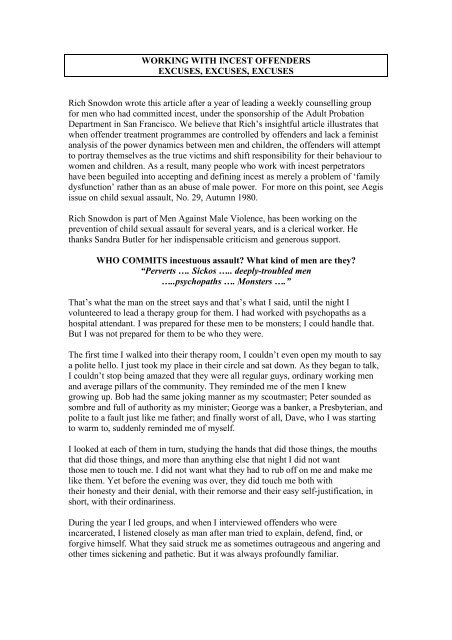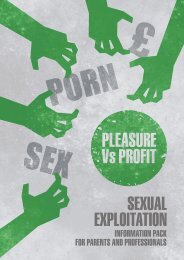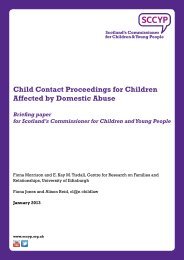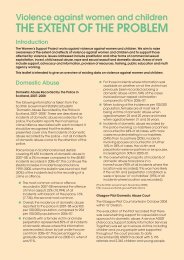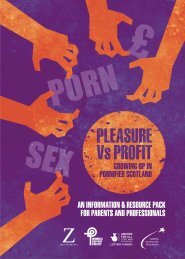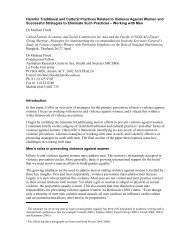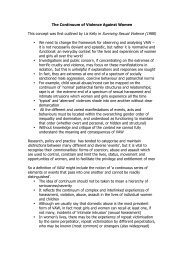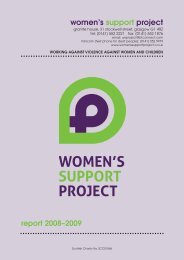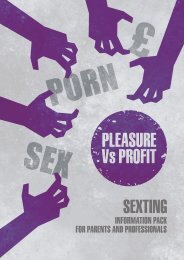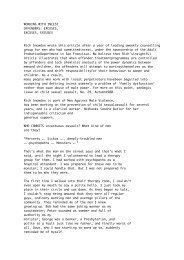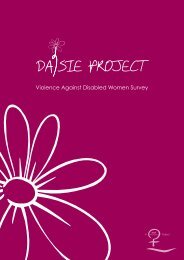WORKING WITH INCEST OFFENDERS EXCUSES, EXCUSES ...
WORKING WITH INCEST OFFENDERS EXCUSES, EXCUSES ...
WORKING WITH INCEST OFFENDERS EXCUSES, EXCUSES ...
Create successful ePaper yourself
Turn your PDF publications into a flip-book with our unique Google optimized e-Paper software.
<strong>WORKING</strong> <strong>WITH</strong> <strong>INCEST</strong> <strong>OFFENDERS</strong><br />
<strong>EXCUSES</strong>, <strong>EXCUSES</strong>, <strong>EXCUSES</strong><br />
Rich Snowdon wrote this article after a year of leading a weekly counselling group<br />
for men who had committed incest, under the sponsorship of the Adult Probation<br />
Department in San Francisco. We believe that Rich’s insightful article illustrates that<br />
when offender treatment programmes are controlled by offenders and lack a feminist<br />
analysis of the power dynamics between men and children, the offenders will attempt<br />
to portray themselves as the true victims and shift responsibility for their behaviour to<br />
women and children. As a result, many people who work with incest perpetrators<br />
have been beguiled into accepting and defining incest as merely a problem of ‘family<br />
dysfunction’ rather than as an abuse of male power. For more on this point, see Aegis<br />
issue on child sexual assault, No. 29, Autumn 1980.<br />
Rich Snowdon is part of Men Against Male Violence, has been working on the<br />
prevention of child sexual assault for several years, and is a clerical worker. He<br />
thanks Sandra Butler for her indispensable criticism and generous support.<br />
WHO COMMITS incestuous assault? What kind of men are they?<br />
“Perverts …. Sickos ….. deeply-troubled men<br />
…..psychopaths …. Monsters ….”<br />
That’s what the man on the street says and that’s what I said, until the night I<br />
volunteered to lead a therapy group for them. I had worked with psychopaths as a<br />
hospital attendant. I was prepared for these men to be monsters; I could handle that.<br />
But I was not prepared for them to be who they were.<br />
The first time I walked into their therapy room, I couldn’t even open my mouth to say<br />
a polite hello. I just took my place in their circle and sat down. As they began to talk,<br />
I couldn’t stop being amazed that they were all regular guys, ordinary working men<br />
and average pillars of the community. They reminded me of the men I knew<br />
growing up. Bob had the same joking manner as my scoutmaster; Peter sounded as<br />
sombre and full of authority as my minister; George was a banker, a Presbyterian, and<br />
polite to a fault just like me father; and finally worst of all, Dave, who I was starting<br />
to warm to, suddenly reminded me of myself.<br />
I looked at each of them in turn, studying the hands that did those things, the mouths<br />
that did those things, and more than anything else that night I did not want<br />
those men to touch me. I did not want what they had to rub off on me and make me<br />
like them. Yet before the evening was over, they did touch me both with<br />
their honesty and their denial, with their remorse and their easy self-justification, in<br />
short, with their ordinariness.<br />
During the year I led groups, and when I interviewed offenders who were<br />
incarcerated, I listened closely as man after man tried to explain, defend, find, or<br />
forgive himself. What they said struck me as sometimes outrageous and angering and<br />
other times sickening and pathetic. But it was always profoundly familiar.
Every Monday night as I sat there in the group trying to figure out how to do this<br />
work and how to make a difference, hard questions kept coming up for me<br />
about what it means to be a man. And with them came a sadness I could not dispel.<br />
I considered myself a “nice guy” who “could never do such a thing.” I wanted these<br />
men to be as different as possible. Yet as I heard them talking about childhood<br />
and their early teen years, I was less and less able to deny how much we had in<br />
common. We grew up learning the same things about how to be men.<br />
Though we practiced them in somewhat different ways or to different degrees. These<br />
were things we never asked to learn and never wanted to. Often they<br />
were forced upon us and often we did our best to resist. But that was usually not<br />
enough, and one way or another, these usually were not enough, and one way or<br />
another, these lessons in masculinity got inside us.<br />
We were taught that privilege is our birthright and aggression is our nature, so we<br />
learned to take, but not to give. We learned to get affection, or express it,<br />
mainly through sex. We expected to marry a woman who would provide for us like a<br />
mother, but obey us like a daughter. And we learned that women and<br />
children belong to men, that there is nothing to keep us from using their labour for our<br />
benefit and their bodies for our pleasure and anger.<br />
It was unnerving to listen to offenders talk and then look back over my own life. I saw<br />
how often I was attracted to a woman who was spirited, spontaneous, caring and<br />
powerful – but not more powerful than me. What I looked for was someone<br />
with a multitude of wonderful qualities, but who at the same time would not question<br />
my definition of our relationship and would not threaten my uncertain comfort by<br />
revealing her needs to me, someone full of giving but easy to command, very much<br />
like a puppy who thinks the world of you, or a child. I had to acknowledge, too, how<br />
hard it continues to be to want, work for, and enjoy a relationship with a<br />
woman who in every important way is equal in power.<br />
During the week between groups, I tried to find a way to understand my encounters<br />
with these men and with myself, and turned to what I thought would<br />
be safely academic studies on the subject. I found important information, but no<br />
comfort. I learned that 95 – 99% of offenders are male, and I had to<br />
recognise that incest is a problem with gender, a men’s problem, one that we force<br />
women and children to deal with. I had to recognise, too, that it is<br />
not a crime committed by “a few sick men who are strangers,” as I had believed most<br />
of my life. When I talked with Lucy Berliner, an expert on victim-advocacy at<br />
Harborview Hospital in Seattle, she told me that one out of every four girls is sexually<br />
assaulted at least once in growing up, and David Finklehor, author of “Sexuallyvictimised<br />
Children” told me the same is true for one out of every eleven<br />
boys. Amazingly, both of them felt their estimates were conservative and they both<br />
said that in 75 – 80% of all cases, the offender is someone the child<br />
knows and often trusts.
The studies brought me right back to the same place my evenings in the group had<br />
taken me. I had to start thinking about millions of men, men with every social,<br />
economic, and professional background. Men who are fathers, grandfathers, uncles,<br />
brothers, husbands, lovers, friends and sons. I had to start thinking about the ordinary<br />
men of America.<br />
To say that incest offenders are “ordinary men” is to challenge ourselves to take a<br />
critical look at male socialisation and find out what is wrong with it. But it<br />
is also a statement men use as an excuse. With increasing numbers of middle class<br />
men being identified as offenders, it’s now quite common to hear police, probation<br />
officers, attorneys, judges and therapists saying: “Most of these men are not criminals.<br />
They have no previous record. They are good men who have simply made a mistake.”<br />
Once they have defined a man as “nice,” then his violence is no longer a crime, and<br />
he receives special treatment, if any treatment at all. But if a man is not defined as<br />
“nice” then his actions, no matter what his motive, will be judged by the letter of the<br />
law. An unemployed father who robs a store so he can buy food for his children is<br />
convicted as a criminal, while a successful father who has been sexually assaulting<br />
his 8-year-old daughter for five years is considered a “good man” who deserves<br />
another chance.<br />
Therapists generally report that incest offenders are not threatening men, that they are<br />
charmers and wimps, and that their acts were merely “distorted love” or “misplaced<br />
affection.” I listened carefully to these descriptions and didn’t know what to think<br />
about them, until taken by surprise one night in the group, I found that just a little<br />
pushing will bring out what’s really beneath the surface. I started a discussion about<br />
enforcing court orders and there was suddenly a tightening of muscles, a clenching of<br />
teeth, and a pounding of fists, a display that said; no masculinity is<br />
lacking here.<br />
I sat there amid the rising anger, a grown man, and was afraid. Everything fell silent<br />
inside me. I stopped hearing the staccato echoes of the voices all around<br />
me. I could only think about a child facing one of these men alone. The fear she must<br />
feel. The bottomless anger she must know is there, even when he is using<br />
her body politely, speaking gentle encouragements to her. Even when he is opening<br />
his needs to her like a beggar, she must either obey or risk his rage. I could<br />
only think about a child who had to find a way to survive assault by herself, who<br />
unlike me, had no escape, no home of her own to go to at 10 o’ clock when the group<br />
was over.<br />
Incest offenders are men who simply have the power to take what they want and who<br />
take it. They are men much too much like any other men. And they too use<br />
that fact as an excuse, hoping to get off easy when they stand before the Judge.
There are some offenders who have the courage to turn themselves in, and some who<br />
will tell the whole truth once they’ve been arrested and will struggle hard<br />
to change themselves, no matter how much it hurts. They are rewarding to work with,<br />
but they are rare. From start to finish., most offenders deny what they’ve<br />
done. Den: “I didn’t do a thing. I was framed. What are they making such a big deal<br />
out of such a little thing/ I just gave her a kiss and they say I raped her. Isn’t a<br />
father supposed to give his daughter a kiss?” Yale: “I didn’t commit incest and<br />
anyone who says I did can step out back with me and we’ll settle this like a man.”<br />
Under pressure, some will come around to admitting that maybe something a little<br />
like incest might have happened once or twice. But then they adamantly deny any<br />
responsibility for it and claim instead that they are themselves the true victims. The<br />
clever fiction they invent to support this claim is much more powerful, damaging, and<br />
dangerous than their stubborn denial ever could be.<br />
Operating on the theory that the best defence is a good offence, they try to soften our<br />
hearts by telling us they are innocents who fell into the hands of a provocative<br />
child or a bad mother. They figure if they can make someone else look like the<br />
monster, they can get off as nice guys. Through the stories they tell, they construct<br />
their fearful version of family – Lolita, The Wicked Witch and Santa Claus.<br />
Lolita: The Child as Seducer<br />
Lolita is the fist of their three descriptions, and whom each of them seems to have for<br />
a daughter. The plot is usually the same, though each man adds his personal<br />
touch. Jack: “She was always walking around half-naked, waggling her behind, so I<br />
did something about it.” Zachary: “She’s a regular little Brooke Shields, how<br />
she dresses. Little girls grow up fast now. They’re just like women. They all want<br />
it.” Thomas: “She kept coming to me and putting her arms around me or<br />
climbing into my lap. She kept wanting me to be affectionate with her. One thing led<br />
to another. She said ‘no’ when it got to sex, but I didn’t believe her, because<br />
why did she want all that other stuff then?” Frank: “My daughter’s a devil. That’s<br />
not a figure of speech. I mean exactly what I say.”<br />
These men are as fast as TV scriptwriters and as facile as professional pornographers,<br />
the way they turn out line after line about the dangerous desires of little girls and how<br />
they’re always getting men into such trouble. Not only do they cast girls as sex<br />
objects, but also as aggressors, as “demon nymphettes.” They define not only the<br />
child’s body but also her soul.<br />
Florence Rush, in The Best-Dept Secret, a remarkable history of child sexual assault,<br />
shows how deep this hatred of girls goes. She explains how Freud based his theory<br />
and built his practice on Lolita, a lie he did so much to develop and to credit.<br />
In his essay on “Femininity,” he wrote “… almost all my women patients told me that<br />
they had been seduced by their father.” But he could not bring himself to believe<br />
that so many men in civilised Vienna were sexually abusing their daughters. So<br />
instead he decided that these women who had trusted him with their most painful<br />
secrets were lying. But that was not the end of it. He claimed that whenever girls<br />
report assault, they are actually revealing their innermost fantasies, expressing their
true nature, and that their expressions mean that they want to be “seduced.” Or in the<br />
words of Lennie and Hank: “She asked for it.”<br />
In our culture this message is so prevalent and forceful, that it is no wonder that girls<br />
take it in and then blame themselves when they are assaulted. It’s no wonder that so<br />
many of them believe they actually are<br />
Lolita.<br />
Carlos, sentenced to three years at Atascadero, a maximum security state hospital for<br />
sex offenders, tells the simple truth about Lolita to anyone who will listen: “Ofcourse<br />
she seduced me, but that was only because I seduced her into seducing me … I was<br />
the adult. I was responsible.” Carlos had once turned on the Donahue Show and seen<br />
Kathy Brady, an incest survivor who wrote Father’s Days, telling the story of her life.<br />
He had broken down and cried his way through the programme. Listening for the<br />
first time with his heart, not with his defences, and at last had begun to understand his<br />
daughter’s terror. It was the truth told from the point of view of the child and the<br />
woman that therapy started.<br />
The Wicked Witch: The Evil Mother<br />
The second deception offenders use is The Wicked Witch, to whom each of them<br />
seems to be married. Even when the victim’s mother is disabled because of illness or<br />
injury, or because she was assaulted as a child herself and has learned all too well her<br />
lessons of submissiveness and despair. She is nonetheless labelled “the collusive<br />
mother” or “the silent partner,” terms invented by therapists implying a latent<br />
malevolence.<br />
Offenders follow this theme to its conclusion, telling stories that come right out of<br />
Hansel and Gretel: A well-meaning, natural father is brow-beaten by an insistent,<br />
controlling wife into doing something terrible to his children. The villains are female,<br />
both the “unnatural” stepmother and her reflection, The Wicked Witch. Any woman<br />
whose “innate” mothering instincts have “failed” been defeated, or turned<br />
“vindictive,” is cloaked with an aura of evil, either fated or willful.<br />
Ulrich put it this way, “My wife was always nagging and bitching at me. She<br />
wouldn’t give me sex. But my daughter looked up to me. She made me feel like a<br />
man. So I went to her for everything.” Evan said: “My wife kept pressuring me to be<br />
around more and be more involved with the children. Meanwhile she was always<br />
cooking and cleaning and complaining about being tired. She didn’t pay much<br />
attention to me or the kids. So I just started getting into mischief with them,<br />
and with my daughter it was molestation.”<br />
“My wife made me do it, it was her fault,” is the spoken or unspoken message. It’s a<br />
contagious excuse. Once one man in a group picks up on it, there’s an epidemic. Yet<br />
one night when I reminded Quentin that he couldn’t miss even one session<br />
unless he had a genuine emergency, he shouted back, “Don’t tell me what to do.<br />
Nobody is going to make me do something I don’t wanna.” He couldn’t<br />
have made it clearer. No woman and no child makes a man commit assault.
When offenders describe the elaborate plans they made and carried out to keep their<br />
violence a secret, they give proof that they are the ones who should be held<br />
responsible, especially those who admit they stopped at nothing to terrify their<br />
children into submission andsilence: “If you tell anyone, I’ll kill you.”<br />
Or, “If you tell your mother, I’ll kill her.”<br />
Yet men commonly think that mothers are supposed to save the family from any and<br />
all problems, including incest, that they are supposed to protect the daughter,<br />
from the father and the father from himself. As a result, both offenders and therapists<br />
often join in blaming the mother. If a mother knows, but doesn’t tell for fear of not<br />
being believed or because she is afraid to send the family’s means of support to jail,<br />
she is blamed for not protecting her child. If she doesn’t know and therefore<br />
can’t tell (the majority of cases), then she is blamed for not knowing, as if she should<br />
never have let her daughter out of her sight, not even in her own home.<br />
Finally, if she finds out and tells, she is blamed for breaking up the family. It’s as if<br />
she should have fixed everything in private, as if she should have been able to<br />
cure her husband overnight by herself, the same man who professional therapists are<br />
hard-pressed to change even after years of court-ordered therapy.<br />
Time and time again, when I told people about the counselling I was doing, they<br />
expressed disgust at what the men did, but rage at the mothers. It was as though<br />
nothing more could be expected of a man, but if a mother was unable to protect her<br />
child, no matter what the reason, then she could never ‘be forgiven’.<br />
It is no wonder that the most common feeling mothers have is a devastating guilt. It<br />
is no wonder that so many believe they actually are The Wicked Witch.<br />
Some offenders, following directly in the footsteps of a growing number of<br />
professionals, back off from such an open attack on mothers. In their drive to present<br />
themselves as compassionate and understanding, they want softer words and the<br />
appearance of accepting shared responsibility. They learn to translate “mother"<br />
Into “family” and turn book titles like The Abusing Family into household phrases.<br />
But whenever they say “family,” “mother” is what they mean. For in our culture,<br />
mother is the one who is responsible for what happens at home. It is nice if the man<br />
takes an interest and helps out, but the buck stops with her.<br />
Sandra Butler, who wrote the very readable and extremely helpful book Conspiracy of<br />
Silence, The Trauma of Incest, answered this cowardly lie, saying simply “Families<br />
don’t assault children sexually, men do.”<br />
Santa Claus: The Generous Father<br />
The third deception offenders use is Santa Claus, whom each of them pretends to be,<br />
the man known for giving children presents, for giving them “what they<br />
like and what they ask for.” They talk about themselves of this kindly Father-Knows-<br />
Best. Stanley: “It wasn’t like I was hurting someone. I was giving her<br />
some affection I thought she needed.” Ian: “I was trying to teach her about sex. I<br />
didn’t want her learning it from some dirty minded boy down the block. I<br />
wanted it to be gentle and caring for her.”
Glen molested two out of his three children. He said he was responding to their pain:<br />
“I loved them, but they were not happy kids. I wanted to help them. With<br />
my 7-year-old daughter, I saw her, I loved her, and I should have picked her up and<br />
given her a hug. Instead I put my penis between her legs. With my 14 year-old son, it<br />
started out with back rubs and went from there. Eventually he had a hot and heavy<br />
affair with me. But don’t think I’m queer or a molester per se. I just didn’t know any<br />
other way to show my love.”<br />
“Why didn’t you assault your oldest son?”<br />
“He was a different kind of person. He was selfsufficient<br />
and independent. He didn’t need me like the<br />
other two did.”<br />
Eric, who described himself as a poet, “thoughtful, gentle, and caring,” told me: “my<br />
stepdaughter was 14 and she wasn’t doing too well at school. Her grades were okay,<br />
but she didn’t have any friends, so she was depressed and alone a lot. Her mother was<br />
transferred to the evening shift at the hospital, so she wasn’t around as much and that<br />
didn’t help either. One night I woke up and heard Laura crying out in the<br />
hall by the heater, so I went out there, put my arms around her, held her, and talked to<br />
her. Before going back to bed, she said, “Daddy, would you hold me<br />
whenever I need to be held?” I said, “Okay.” Later with the two of us getting closer<br />
and closer, it turned to sex.” He continued to give his stepdaughter his kind of<br />
“nurturing” even during the period when he was having intercourse with her - when<br />
she became suicidal and “needed to be held more than usual.”<br />
There are some men who set aside the Santa disguise and reveal the dynamics of<br />
incest with a terrible, but honest arrogance. Alan: “My child’s body is as much mine<br />
as it is hers.” Vince: “She told me, you have to.” Mike: “I pick on children because<br />
their safer, that’s all. They don’t talk back to you like a woman.” Rod: “She’s my<br />
girl, so that gives me the right to do anything with her I want to. So stick your nose<br />
out of it; my family is my business.”<br />
These fathers acknowledge that they could do what they did only because they could<br />
make their children obey and could command silence. They used nothing more than<br />
the power any ordinary father has.<br />
Yet it is this very power that most men deny when they are caught and convicted.<br />
Once proud to be in charge, they suddenly characterise themselves as incapable of<br />
taking control of anything, including their own actions. Xavier: “I didn’t know what I<br />
was doing. How did this happen to me”. Walt: She asked me to do it, and I just<br />
went along with it. I never could say ‘no’ to her.” Owen: “I fell in love with my<br />
daughter. I mean I really fell in love with her. After that I couldn’t stop myself.”
They argue that they were helpless prey in the face of Lolita’s intimidating schemes.<br />
Once she turned them on, they were at her mercy and could no longer be held<br />
accountable. When a man thinks like this, it doesn’t matter what his daughter says or<br />
does not say, does or does not do; just by being a girl in a girl’s body, she is<br />
the incarnation of seduction. She is a “natural temptation” to which his “natural<br />
impulses” make him completely vulnerable. So he can scarcely be expected to resist.<br />
He believes he is a hero if he refuses to succumb and an ordinary guy if he “gives in.”<br />
As long as these men deny their own power and the power of men as a group, they<br />
also deny the responsibility men share, and so nothing changes. They deny that they<br />
can respond to stress with solutions instead of assault: “My boss was critical of me all<br />
the time. My son was picked up by the police for stealing cars. My wife couldn’t<br />
stand to be around me anymore. I was trying to take care of everything by myself. No<br />
one was looking after me. That’s where my daughter came in.”<br />
They deny that they can change themselves, despite their socialisation: “My<br />
conditioning made me do it. I’m a slave to my conditioning.” Or, “I’m sick … I’m<br />
evil … I’m messed up … There’s nothing I can do about it, so<br />
there’s nothing I have to do about it, so leave me alone.” They deny that fathers can<br />
learn to nurture their children instead of requiring the reverse, especially making their<br />
daughters serve as little mothers: “I thought children were supposed to be magic and<br />
cure my hurts. Kiss me and make it all better.”<br />
The men in my group told me over and over that they were tired of being identified as<br />
offenders and having to talk about assault all the time. They said they<br />
just wanted to have their families living together again “like other families,” and to<br />
get back to being “regular fathers like other men are.”<br />
If only it were that easy. But given the men grow up, it can’t be. And the challenge<br />
they continue to face is one I had to face with them – to understand that being an “<br />
ordinary man” is not enough – not for any of us.<br />
Norm told me: “The first step is saying, ‘Yes, I did it. I have a problem.’ But that’s<br />
only the first step. The second step is to start tearing yourself apart and<br />
rebuilding.” “How deep does the tearing apart have to go?” “All the way down. It has<br />
to go all the way down to the core. Every little hole and cranny that something is<br />
hidden in – that has to be pulled out. Every bit of it. None of it can stay down there.<br />
You can’t say, ‘Well, this is my sexual part, I can just deal with that.’ No<br />
way. It ‘s the whole being that has to be ripped apart and rebuilt again. I’m finding<br />
that leaves a big empty void inside me. An emptiness that used to be filled with<br />
something I didn’t like. But I like what I’m putting back in. I’m finding something to<br />
put back in there that’s fresh.”<br />
Lamond explained, as we were sitting by his window looking out through the bars:<br />
“We all knew what we were doing was wrong, but we each had stories we<br />
told ourselves, so we could keep on doing it.”<br />
Lolita, The Wicked Witch, and Santa Clause are those stories. They are not tales men<br />
read to their daughters and sons at bedtime to help them fall peacefully<br />
asleep, but stories they make their children live. Stories of endless terror.
When we were boys, we didn’t have the power to stop lies and violence, but now we<br />
are men, we do. We have the power to tell the truth. We have the power to<br />
stand with boys who are growing up now and help them defend their caring. We have<br />
the power to stop being “ordinary guys” and become something much better – men<br />
with whom children and women can be safe.<br />
Reproduced by: Women’s Support Project.<br />
women’s support project<br />
granite house, 31 stockwell street, glasgow G1 4RZ tel: (0141) 552 2221 fax:<br />
(0141) 552 1876 email: wsproject@btconnect.com<br />
<strong>WORKING</strong> AGAINST VIOLENCE AGAINST WOMEN AND CHILDREN


